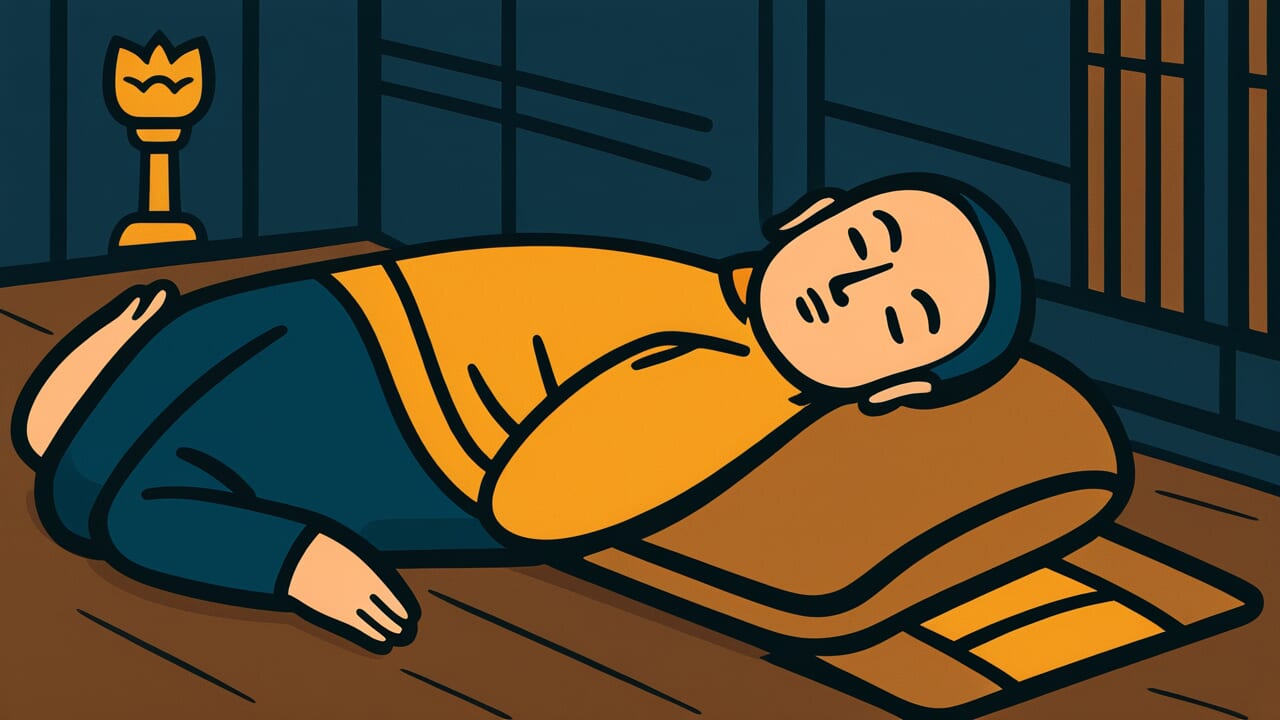How to Read “While sleeping, a Buddha”
Neta ma wa hotoke
Meaning of “While sleeping, a Buddha”
“While sleeping, a Buddha” is a proverb that describes how people are innocent and harmless when they sleep. No matter how troublesome someone’s behavior is when awake, they do nothing wrong while asleep.
This proverb is used when talking about difficult people. For example, someone might be violent, selfish, or cause problems during the day. But when you see them sleeping, they look calm and harmless.
When people say “While sleeping, a Buddha,” they express both complaints about the person’s waking behavior and a touch of affection.
Even today, this phrase describes the dual nature of humans. While conscious, people are driven by desires and emotions. But during sleep, they return to a pure and innocent state.
This proverb contains deep insight based on human observation.
Origin and Etymology
No clear written records explain the origin of this proverb. However, we can make interesting observations from how the phrase is constructed.
The word “Buddha” suggests influence from Buddhist thought. Buddhism values a pure state of mind free from worldly desires and cravings.
When you look at someone sleeping, they truly appear calm and peaceful. Anger, greed, jealousy, and hatred all disappear from their quiet expression.
This expression likely arose from the sharp observation skills of Japanese people. While awake, people are swayed by various emotions. Sometimes they hurt others or torment themselves.
But the moment they fall asleep, all malice vanishes. Just as everyone feels tenderness watching a baby sleep, sleeping people possess an innocent beauty.
This phrase also contains a spirit of tolerance. No matter how troublesome someone is, they cannot commit sins while sleeping.
Seeing them in that state, people might forgive their waking behavior just a little. This shows a warm understanding of human nature.
This expression naturally emerged from everyday life. It contains deep insight into humanity.
Usage Examples
- That child is “while sleeping, a Buddha,” but once awake, the chaos starts again
- My usually nagging boss is “while sleeping, a Buddha” now that he’s dozing off
Universal Wisdom
The proverb “While sleeping, a Buddha” speaks a deep truth about human nature. It offers the insight that most human evil and problematic behavior comes from conscious activity.
Think about it. People hurt others, act on desires, or explode in anger only while awake. Sleeping people hurt no one. They tell no lies. They commit no theft.
In other words, most human sins and mistakes arise when consciousness is active.
This proverb has been passed down because it shows both tolerance and hope for humanity. Even the most difficult person retains a pure part inside.
Their sleeping form proves this. No matter how problematic their waking behavior, you cannot completely abandon them. This reflects a warm understanding of human nature.
At the same time, this proverb acknowledges human weakness. We are not perfect. While awake, we are tossed about by various temptations and emotions.
But that is what it means to be human. If we can become like Buddha even just during sleep, perhaps that is the salvation left to humanity.
This phrase contains deep understanding of humans and a spirit of realistic acceptance, not resignation.
When AI Hears This
When we measure the sleeping brain, the prefrontal cortex shows significantly reduced activity. This area handles self-evaluation and reflection like “What do they think of me?” or “I messed up saying that.”
In other words, during sleep, the “self-consciousness function” is literally turned off.
Even more interesting is the change in the default mode network. This brain circuit constantly thinks about “past failures” and “future anxieties” while awake.
Meditation research confirms that skilled monks intentionally suppress this circuit’s activity to achieve peace of mind. But ordinary people automatically reach the same state through sleep.
Without any training, we experience an “enlightened state” for eight hours every night.
However, the moment we wake up, the prefrontal cortex returns to normal activity levels in about 15 minutes. Immediately, thoughts like “Will today’s presentation go okay?” or “Was yesterday’s text message weird?” restart.
This switching speed is remarkable. The brain precisely reboots the same neural circuit patterns every morning.
In other words, “While sleeping, a Buddha” shows that human worldly desires are physical brain activity patterns. They are reversible, like a switch that can turn on and off.
Enlightenment is not a distant goal. It is actually a state we reach every night.
Lessons for Today
This proverb teaches modern people how to view others when evaluating them. We tend to see only someone’s problematic behavior and reject their entire being.
But “While sleeping, a Buddha” reminds us that every person retains a pure part inside.
In modern society, social media quickly spreads others’ failures and problematic behavior. Sometimes a person’s entire character gets rejected.
However, if we return to the spirit of this proverb, we realize humans are more complex and multifaceted. Waking behavior alone does not define a person completely.
This phrase also teaches kindness toward yourself. Even if you spoke harsh words to someone today or became emotional, that is not all of who you are.
When you sleep, you are a calm being who hurts no one. That part is also the real you.
Maintaining tolerance and hope for humanity. That is the warm message this proverb gives to those of us living in modern times.



Comments